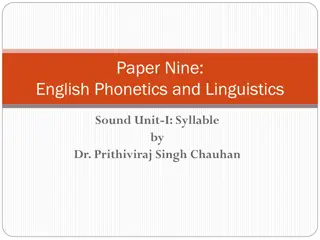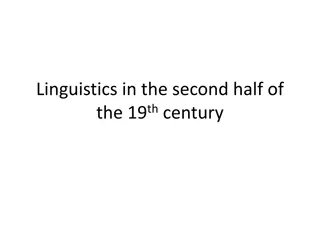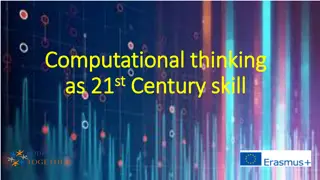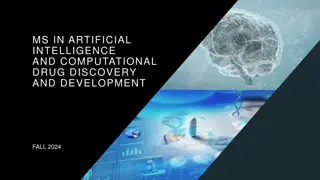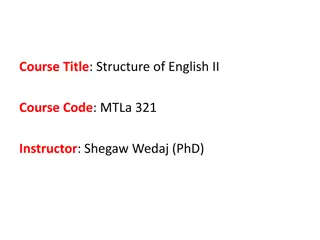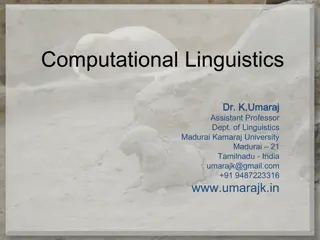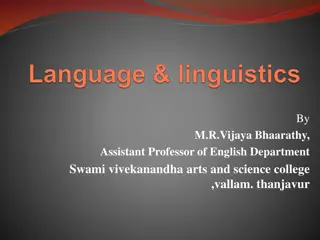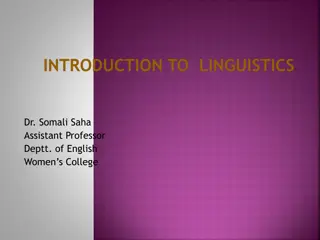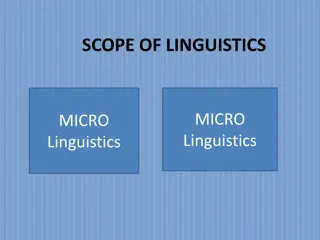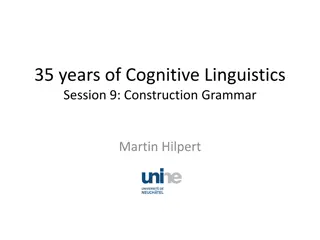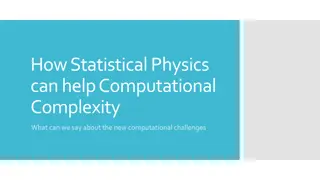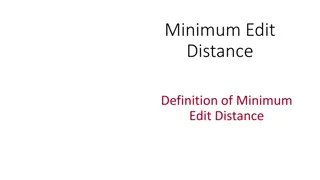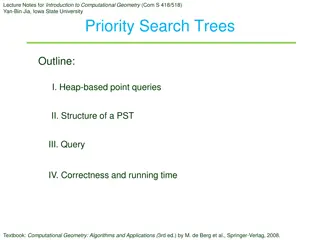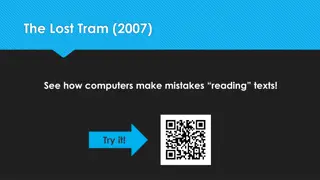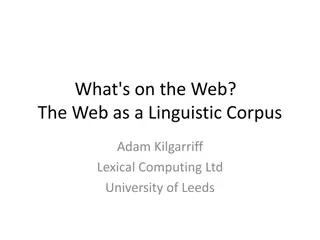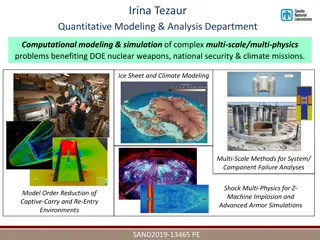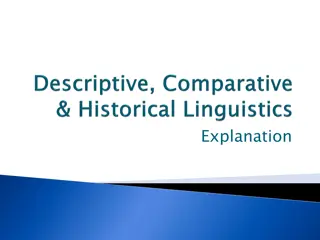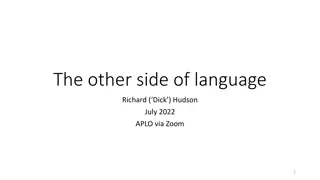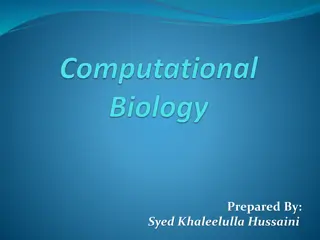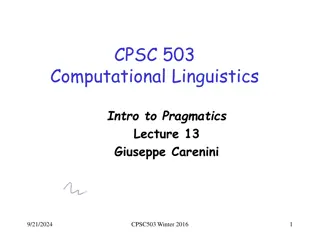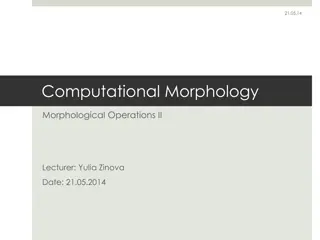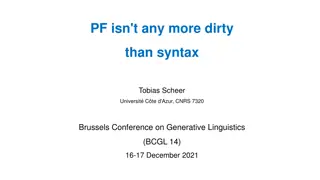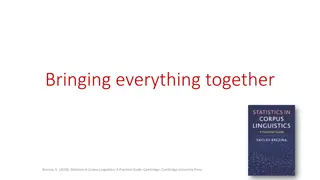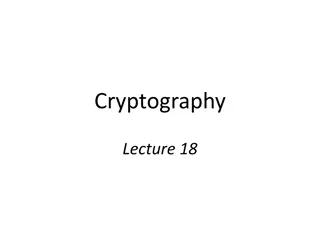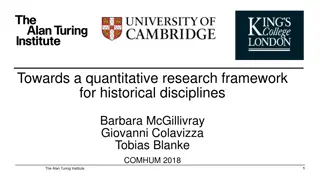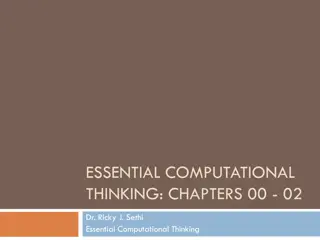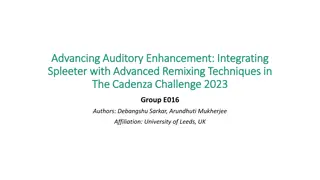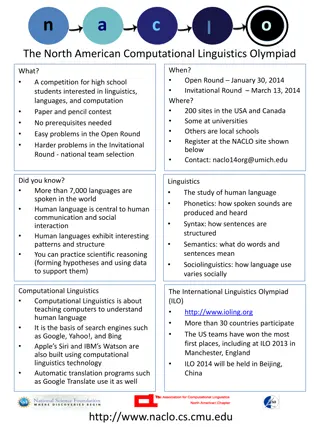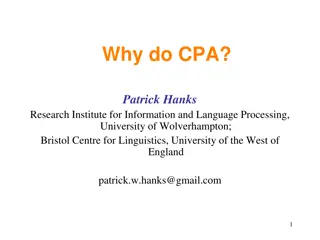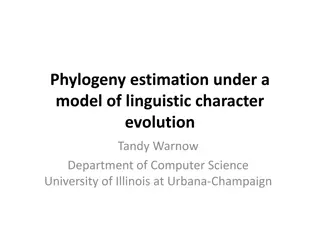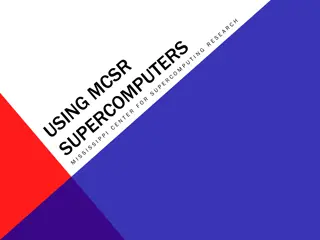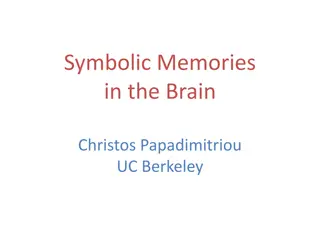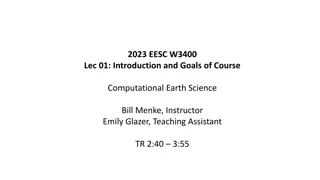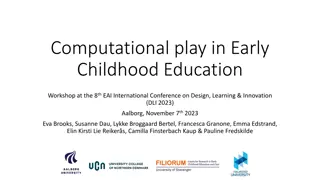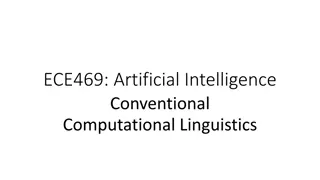Understanding English Syllables: Phonetics and Linguistics Insights
Explore the concept of syllables in English phonetics and linguistics, learning about syllable formation, examples of mono and disyllabic words, and the role of vowels and consonants in syllable structure. Delve into the essence of syllables as individual sound units within words. Discover more thro
11 views • 8 slides
Linguistics in the Second Half of the 19th Century: Schleicher, Psycholinguistics, Neogrammarian Theories
August Schleicher's biological approach to language, including his Stammbaumtheorie, aligned with Darwinian ideas prevalent in the 19th century. The origins of psycholinguistics can be traced back to Heymann Steinthal, who advanced the psychology of language. This period saw critical developments in
4 views • 22 slides
An Exploration of Stylistics in Linguistics: Expressive Means and Stylistic Devices 2. Stylistics as a branch of linguistics examines expressive means and stylistic devices which enhance the emotive and aesthetic qualities of language. These include
Stylistics, Linguistics, Expressive Means, Stylistic Devices, Language
5 views • 25 slides
Computational thinking as 21st Century skill
Computational thinking is a critical skill for the digital age, involving problem-solving techniques that enable computers to process information effectively. It precedes programming and requires breaking down complex problems into manageable steps. Educators emphasize computational thinking exercis
7 views • 4 slides
Master's Program in Computational Drug Discovery and Development - Fall 2024 Curriculum
This Master's program offers a comprehensive curriculum focusing on Artificial Intelligence, Computational Drug Discovery, and Development. With a blend of cutting-edge technologies and practical applications, students delve into techniques, AI/ML, big data mining, modeling, and more. Through intens
1 views • 7 slides
Challenges and Solutions in Implementing Historical Competencies in Teaching
Explore the complexities and obstacles faced in implementing historical competencies in teaching, as discussed by Jens Aage Poulsen, a senior lecturer and researcher at HistoryLab, University College Lillebaelt, Denmark. The content delves into competence-based curriculum, core historical competenci
0 views • 7 slides
Understanding Structural Linguistics: An Exploration of Language and Signs
Delve into the intricate world of structural linguistics through an in-depth analysis of language components, linguistic signs, and the relationship between language and linguistics. Explore the concepts of syntagmatic vs. paradigmatic relations, linguistic signs as associations of sound and meaning
4 views • 62 slides
Understanding Computational Linguistics and Natural Language Processing
Explore the fascinating fields of Computational Linguistics and Natural Language Processing (NLP), delving into their development, applications, and significance. Learn about the study of human languages in computational models, the importance of corpora in linguistic research, and the various types
3 views • 33 slides
Understanding Linguistics: An Overview of Language Study
Linguistics is the scientific study of human language systems, encompassing phonetics, syntax, semantics, phonology, pragmatics, and morphology. It explores how language functions, aids in language teaching, and facilitates error analysis. The scope of linguistics includes investigating sound system
1 views • 21 slides
Understanding Linguistics: Overview, Branches, and Scopes
Linguistics explores the study of language, encompassing its nature, structure, and functions. It delves into the characteristics of human language, definitions, branches such as applied linguistics and psycholinguistics, as well as scopes like microlinguistics and macrolinguistics. The field invest
1 views • 11 slides
Overview of Micro and Macro Linguistics
Micro linguistics focuses on the scientific study of speech sounds, word formation, syntax, and meaning within a language, while macro linguistics delves into the societal, psychological, and neurological aspects of language use. Micro linguistic areas include phonetics, phonology, morphology, synta
1 views • 7 slides
Exploring Construction Grammar in Cognitive Linguistics Symposium
Delve into the realm of Construction Grammar with Martin Hilpert in the 35th year of Cognitive Linguistics. Discover the intricacies of idiomatic constructions, the distinction between constructions and constructs, coercion in neologisms, and more. Explore the relationship between Construction Gramm
1 views • 81 slides
Understanding Computational Complexity Through Statistical Physics
In the age of vast data growth, tackling complex computational problems is crucial. Statistical physics can provide insights into handling the new challenges arising from the exponential increase in data. As we delve into understanding the complexity of computational tasks, it becomes evident that e
0 views • 24 slides
Understanding Minimum Edit Distance in Computational Linguistics
Edit distance, such as Levenshtein distance, quantifies the similarity between strings by counting operations needed for transformation. It finds applications in spell correction, DNA sequence alignment, machine translation, and speech recognition. The minimum edit distance measures the minimum numb
0 views • 40 slides
Introduction to Priority Search Trees in Computational Geometry
This lecture outlines the structure and query process of Priority Search Trees (PST) in computational geometry. It covers heap-based point queries, range trees for windowing queries, handling query ranges in 1D and 2D spaces, and using heaps to efficiently handle query ranges. The content discusses
1 views • 18 slides
Understanding Applied Linguistics: Definitions, Rationale, and Purpose
Delve into the realm of applied linguistics through a comprehensive outline featuring historical perspectives, defining moments, and the overarching purpose of this field. Explore how applied linguistics tackles language-related social issues and addresses challenges in education and communication.
0 views • 12 slides
Explore the World of Computational Linguistics: An Interactive Journey
Embark on a captivating interactive journey into the realm of computational linguistics through a series of engaging activities and challenges. Discover how machines process texts, decode mysterious languages, understand Japanese with data structures, and more. Test your skills in deciphering langua
0 views • 44 slides
Understanding Corpus Linguistics in Web Research
Explore the world of corpus linguistics through Adam Kilgarriff's research, delving into the definition of a corpus, its historical background, types, parameters, and the vastness of linguistic data available on the web since the 1960s. Discover the significance of corpora in various fields such as
0 views • 19 slides
Advancing Computational Modeling for National Security and Climate Missions
Irina Tezaur leads the Quantitative Modeling & Analysis Department, focusing on computational modeling and simulation of complex multi-scale, multi-physics problems. Her work benefits DOE nuclear weapons, national security, and climate missions. By employing innovative techniques like model order re
0 views • 6 slides
Evolution of Linguistics: From Philosophy to Descriptive Study
Linguistics has evolved significantly from being a branch of philosophy to a distinct field called Descriptive Linguistics. It now focuses on studying language in itself rather than in relation to other disciplines, aiming to describe and analyze the structure and operation of languages at different
0 views • 20 slides
Understanding Halliday's Systemic Functional Linguistics
Exploring the concepts of Systemic Functional Linguistics as introduced by Halliday, this text delves into the role of language in everyday interactions, cultural studies, and literary theories. It highlights the different functions of language - interpersonal, ideational, and textual - and their ap
0 views • 25 slides
Exploring Linguistics and the Linguistics Olympiad
Dive into the world of linguistics with retired Professor Dick Hudson as he shares his journey of discovery and passion for language. Explore the challenges and joys of the Linguistics Olympiad, bridging the gap between the hard and soft sides of language. Discover the intricate connections in langu
0 views • 41 slides
Understanding Computational Biology: Proteins, DNA, RNA, Genetics, and Evolution
Computational Biology combines computational methods with molecular biology to solve biological problems. Explore topics like proteins, DNA, RNA, and genetics, learning about amino acids, nucleotides, and the genetic code. Understand the evolutionary processes of mutation and natural selection.
0 views • 21 slides
Understanding Computational Linguistics: Pragmatics and Formalisms
Explore the world of computational linguistics through topics like pragmatics, formalisms, knowledge representation, state machines, neural models, semantics, and discourse analysis. Dive into the intricacies of language structures, meanings, and contextual inferences to unravel the complexities of
0 views • 64 slides
Morphological Operations in Computational Linguistics
Explore different morphological operations in computational linguistics, including phonological changes induced by affixation in German, subsegmental morphology in Irish, and subtractive morphology in Koasati. Transducers and examples are provided to illustrate the transformations involved in each p
0 views • 12 slides
Exploring Minimalism in Linguistics: Dirty PF and Clean Syntax
This text delves into the relationship between syntax and PF (Phonological Form) in the context of minimalism theory in linguistics. It discusses how minimalism aims to achieve clean syntax by discarding imperfect elements, with PF often considered as "dirty" due to its association with phonology. T
0 views • 40 slides
Practical Guide to Statistics in Corpus Linguistics
This content provides insights on statistical thinking principles in corpus linguistics, emphasizing attention to detail, data quality, effect size calculation, visualization, and the interplay between statistics and linguistics. It also touches on key learnings, clarifications, and directions based
0 views • 20 slides
Exploring Modern Trends in Linguistics
Cognitive linguistics, functional grammar, text linguistics, and communicative linguistics are shaping the field of linguistics in the 21st century. These trends delve into the cognitive aspects of language, emphasizing language's role in organizing and conveying information. Cognitive linguistics h
0 views • 37 slides
Introduction to Computational Number Theory in Cryptography
Practical private-key cryptography can be done without advanced math, but understanding computational number theory is essential for public-key encryption. This field focuses on the computational difficulty of problems, analyzing algorithms' running times, classifying problems as easy or hard based
0 views • 27 slides
Quantitative Research Framework for Historical Disciplines
Scholarly communities in historical disciplines are combining quantitative and qualitative methods to study phenomena that change over time. The proposed general methodological reflection aims to enhance research in historical linguistics through quantitatively driven models and claims. Quantitative
0 views • 18 slides
Understanding the Essence of Computer Science and Computational Thinking
Delve into the fundamentals of Computer Science and Computational Thinking through chapters discussing the nature of science, predictions in physics, and the distinction between Computer Science and Computer Information Systems. Explore the relationships between Math, Physics, and Computer Science i
0 views • 29 slides
Advancing Auditory Enhancement: Integrating Spleeter with Advanced Remixing Techniques in The Cadenza Challenge 2023
Our project for The Cadenza Challenge 2023 focused on improving audio for headphone users with hearing loss by integrating Spleeter's deep learning capabilities. We utilized N-ALR prescriptions, Butterworth bandpass filters, and Dynamic Range Compression to enhance audio quality. By leveraging advan
0 views • 19 slides
North American Computational Linguistics Olympiad: A Competition for High School Students
The North American Computational Linguistics Olympiad (NACLO) is a competition for high school students interested in linguistics, languages, and computation. It consists of an Open Round in January and an Invitational Round in March, with no prerequisites needed. Participants tackle easy problems i
0 views • 4 slides
Unlocking the Power of Phraseology in Linguistics Research
CPA, led by Patrick Hanks, delves into collocation analysis and meaning interpretation in linguistics. By examining phraseological patterns, the institute aims to build a comprehensive inventory for various verb senses, highlighting the significance of normative and exploitative linguistic uses. The
0 views • 9 slides
Evolution of Indo-European Languages through Phylogeny Estimation
Explore the evolution of Indo-European languages through phylogeny estimation under a model of linguistic character evolution. Follow the Computational Historical Linguistics Project's collaboration that began in 1994, leading to the development of methods and studies on homoplasy-free evolution and
0 views • 61 slides
Mississippi Center for Supercomputing Research (MCSR) Overview
The Mississippi Center for Supercomputing Research (MCSR) supports computational research in various fields like Chemistry, Bioinformatics, Physics, Engineering, and Computer Science for Mississippi IHLs. They provide training to optimize computational resources, offer classes for computational trai
0 views • 23 slides
Exploring Computational Theories of Brain Function
In this series of images and text snippets, the discussion revolves around the emerging field of computational theories of brain function. Various aspects such as symbolic memories, the relationship between the brain and computation, the emergence of the mind from the brain, and computational thinki
0 views • 53 slides
Computational Earth Science Course Overview
Explore the world of Computational Earth Science with Bill Menke as the instructor and Emily Glazer as the teaching assistant. The course aims to help you become proficient in applying Python-based computational methods to understand dynamic Earth Science phenomena. Through modeling, you will gain i
0 views • 34 slides
Exploring Computational Play in Early Childhood Education: DLI 2023 Workshop
The workshop at the 8th EAI International Conference on Design, Learning & Innovation (DLI 2023) in Aalborg aims to delve into the application of computational play with mathematics in early childhood education. Through live sessions and discussions, opportunities and challenges in utilizing computa
0 views • 7 slides
Understanding Natural Language Processing: Disciplines and Challenges
Natural Language Processing (NLP) is a subset of AI dealing with processing human languages. This field is intertwined with linguistics, psychology, philosophy, and computational linguistics. Challenges in NLP arise due to the complexities of language understanding, as illustrated by parsing sentenc
0 views • 40 slides
